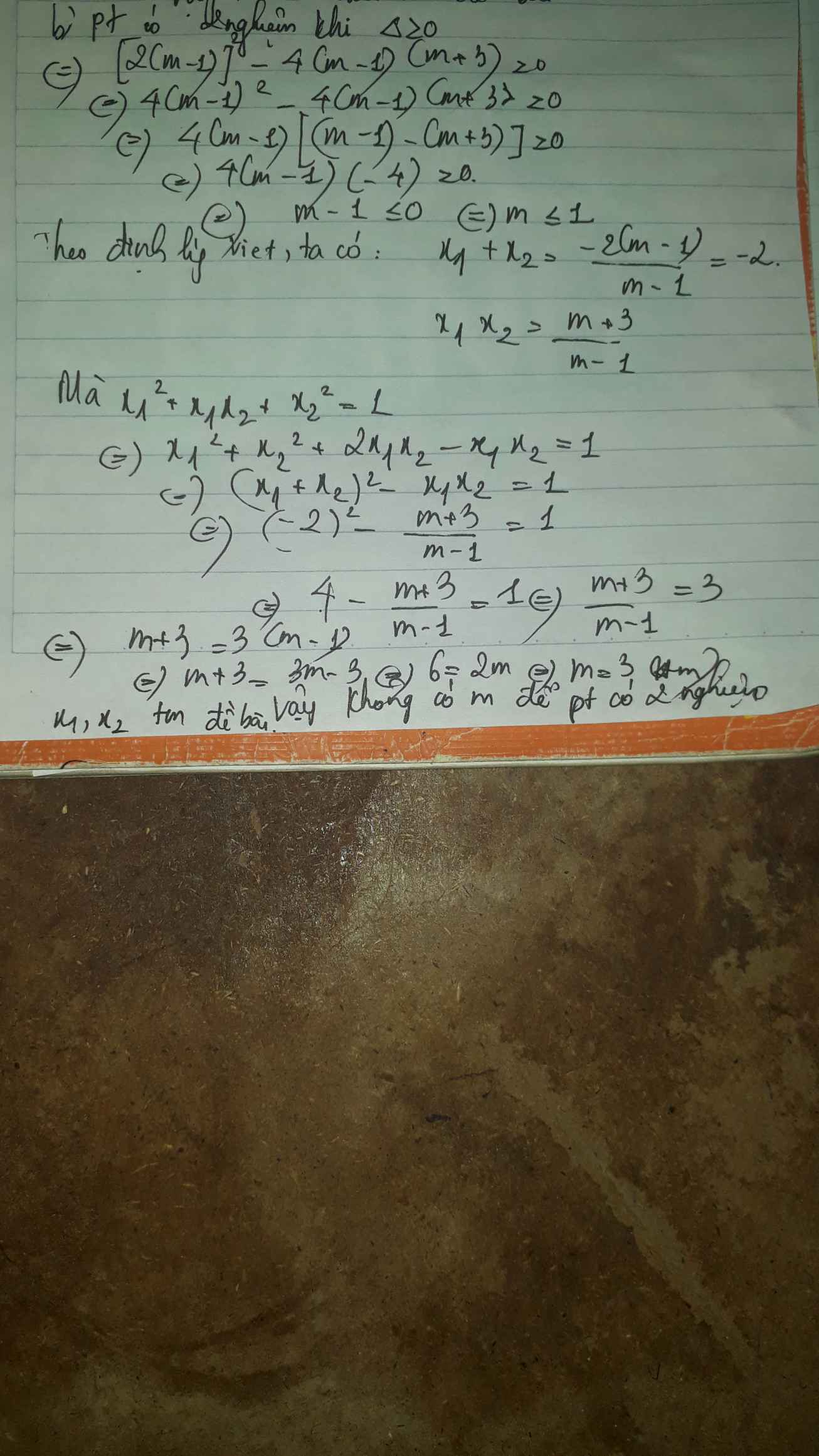Hãy nhập câu hỏi của bạn vào đây, nếu là tài khoản VIP, bạn sẽ được ưu tiên trả lời.

Δ=(m+2)^2-4*2m=(m-2)^2
Để PT có hai nghiệm pb thì m-2<>0
=>m<>2
\(\dfrac{1}{x_1}+\dfrac{1}{x_2}=\dfrac{x_1x_2}{4}\)
=>\(\dfrac{x_1+x_2}{x_1x_2}=\dfrac{x_1x_2}{4}\)
=>\(\dfrac{m+2}{2m}=\dfrac{2m}{4}=\dfrac{m}{2}\)
=>2m^2=2m+4
=>m^2-m-2=0
=>m=2(loại) hoặc m=-1

Ta có: \(\Delta=4m^2+4m-11\)
Để phương trình có 2 nghiệm phân biệt \(\Leftrightarrow4m^2+4m-11>0\)
Theo Vi-ét, ta có: \(\left\{{}\begin{matrix}x_1+x_2=2m+3\\x_1x_2=2m+5\end{matrix}\right.\)
Để phương trình có 2 nghiệm dương phân biệt
\(\Leftrightarrow\left\{{}\begin{matrix}4m^2+4m-11>0\\2m+3>0\\2m+5>0\end{matrix}\right.\) \(\Leftrightarrow\left\{{}\begin{matrix}\left[{}\begin{matrix}m< \dfrac{-1-2\sqrt{3}}{2}\\m>\dfrac{-1+2\sqrt{3}}{2}\end{matrix}\right.\\m>-\dfrac{3}{2}\\m>-\dfrac{5}{2}\end{matrix}\right.\) \(\Leftrightarrow m>\dfrac{-1+2\sqrt{3}}{2}\)
Mặt khác: \(\dfrac{1}{\sqrt{x_1}}+\dfrac{1}{\sqrt{x_2}}=\dfrac{4}{3}\)
\(\Rightarrow\dfrac{x_1+x_2+2\sqrt{x_1x_2}}{x_1x_2}=\dfrac{16}{9}\) \(\Rightarrow\dfrac{2m+3+2\sqrt{2m+5}}{2m+5}=\dfrac{16}{9}\)
\(\Rightarrow18m+27+18\sqrt{2m+5}=32m+80\)
\(\Leftrightarrow14m-53=18\sqrt{2m+5}\)
\(\Rightarrow\) ...

\(\Delta=\left(m+3\right)^2-4\left(m-1\right)=\left(m+1\right)^2+12>0;\forall m\)
\(\Rightarrow\) Pt luôn có 2 nghiệm pb
Theo hệ thức Viet: \(\left\{{}\begin{matrix}x_1+x_2=m+3\\x_1x_2=m-1\end{matrix}\right.\)
\(x_1< -\dfrac{1}{4}< x_2\Leftrightarrow\left(x_1+\dfrac{1}{4}\right)\left(x_2+\dfrac{1}{4}\right)< 0\)
\(\Leftrightarrow x_1x_2+\dfrac{1}{4}\left(x_1+x_2\right)+\dfrac{1}{16}< 0\)
\(\Leftrightarrow m-1+\dfrac{1}{4}\left(m+3\right)+\dfrac{1}{16}< 0\)
\(\Leftrightarrow20m-3< 0\Rightarrow m< \dfrac{3}{20}\)

Lời giải:
Để pt có 2 nghiệm thì:
$\Delta'=(m+1)^2-(m^2+m-1)\geq 0$
$\Leftrightarrow m+2\geq 0\Leftrightarrow m\geq -2$
Áp dụng định lý Viet, với $x_1,x_2$ là nghiệm của pt thì ta có:
$x_1+x_2=2(m+1)$
$x_1x_2=m^2+m-1$
Khi đó:
$\frac{1}{x_1}+\frac{1}{x_2}=4$
$\Leftrightarrow \frac{x_1+x_2}{x_1x_2}=4$
$\Leftrightarrow \frac{2(m+1)}{m^2+m-1}=4$
$\Rightarrow 2m^2+m-3=0$
$\Leftrightarrow (m-1)(2m+3)=0$
$\Leftrightarrow m=1$ hoặc $m=\frac{-3}{2}$ (đều thỏa mãn)

a: Thay m=-5 vào (1), ta được:
\(x^2+2\left(-5+1\right)x-5-4=0\)
\(\Leftrightarrow x^2-8x-9=0\)
=>(x-9)(x+1)=0
=>x=9 hoặc x=-1
b: \(\text{Δ}=\left(2m+2\right)^2-4\left(m-4\right)=4m^2+8m+4-4m+16=4m^2+4m+20>0\)
Do đó: Phương trình luôn có hai nghiệm phân biệt
\(\dfrac{x_1}{x_2}+\dfrac{x_2}{x_1}=-3\)
\(\Leftrightarrow x_1^2+x_2^2=-3x_1x_2\)
\(\Leftrightarrow\left(x_1+x_2\right)^2+x_1x_2=0\)
\(\Leftrightarrow\left(2m+2\right)^2+m-4=0\)
\(\Leftrightarrow4m^2+9m=0\)
=>m(4m+9)=0
=>m=0 hoặc m=-9/4

b) phương trình có 2 nghiệm \(\Leftrightarrow\Delta'\ge0\)
\(\Leftrightarrow\left(m-1\right)^2-\left(m-1\right)\left(m+3\right)\ge0\)
\(\Leftrightarrow m^2-2m+1-m^2-3m+m+3\ge0\)
\(\Leftrightarrow-4m+4\ge0\)
\(\Leftrightarrow m\le1\)
Ta có: \(x_1^2+x_1x_2+x_2^2=1\)
\(\Leftrightarrow\left(x_1+x_2\right)^2-2x_1x_2=1\)
Theo viet: \(\left\{{}\begin{matrix}x_1+x_2=-\dfrac{b}{a}=2\left(m-1\right)\\x_1x_2=\dfrac{c}{a}=m+3\end{matrix}\right.\)
\(\Leftrightarrow\left[-2\left(m-1\right)^2\right]-2\left(m+3\right)=1\)
\(\Leftrightarrow4m^2-8m+4-2m-6-1=0\)
\(\Leftrightarrow4m^2-10m-3=0\)
\(\Leftrightarrow\left[{}\begin{matrix}m_1=\dfrac{5+\sqrt{37}}{4}\left(ktm\right)\\m_2=\dfrac{5-\sqrt{37}}{4}\left(tm\right)\end{matrix}\right.\Rightarrow m=\dfrac{5-\sqrt{37}}{4}\)

1, ĐKXĐ:\(x\ne2,y\ne1\)
Đặt `1/(x-2)` = a, `1/(y-1)` = b
\(Hệ.\Leftrightarrow\left\{{}\begin{matrix}a+b=2\\2a-3b=1\end{matrix}\right.\\ \Leftrightarrow\left\{{}\begin{matrix}a=\dfrac{7}{5}\\b=\dfrac{3}{5}\end{matrix}\right.\\ \Leftrightarrow\left\{{}\begin{matrix}\dfrac{1}{x-2}=\dfrac{7}{5}\\\dfrac{1}{y-1}=\dfrac{3}{5}\end{matrix}\right.\)
\(\Leftrightarrow\left\{{}\begin{matrix}7x-14=5\\3y-3=5\end{matrix}\right.\\ \Leftrightarrow\left\{{}\begin{matrix}x=\dfrac{19}{7}\\y=\dfrac{8}{3}\end{matrix}\right.\)\(2,\Delta'=\left[-\left(m+1\right)\right]^2-4m=m^2+2m+1-4m=m^2-2m+1=\left(m-1\right)^2\ge0\)
Để pt có 2 nghiệm phân biệt thì \(\Delta'>0\Leftrightarrow\left(m-1\right)^2>0\Leftrightarrow m-1\ne0\Leftrightarrow m\ne1\)
b, Theo Vi-ét:\(\left\{{}\begin{matrix}x_1+x_2=2m+2\\x_1x_2=4m\end{matrix}\right.\)
\(\left(x_1-x_2\right)^2-x_1x_2=3\\ \Leftrightarrow\left(x_1+x_2\right)^2-5x_1x_2=3\\ \Leftrightarrow\left(2m+2\right)^2-5.4m-3=0\\ \Leftrightarrow4m^2+8m+4-20m-3=0\\ \Leftrightarrow4m^2-12m+1=0\\ \Leftrightarrow\left[{}\begin{matrix}x=\dfrac{3+2\sqrt{2}}{2}\\x=\dfrac{3-2\sqrt{2}}{2}\end{matrix}\right.\)

PT có 2 nghiệm `<=> \Delta' >0 <=> 2^2-1.(m+1)>0<=> m<3`
Viet: `x_1+x_2=-4`
`x_1 x_2=m+1`
`(x_1)/(x_2)+(x_2)/(x_1)=10/3`
`<=> (x_1^2+x_2^2)/(x_1x_2)=10/3`
`<=> ((x_1+x_2)^2-2x_1x_2)/(x_1x_2)=10/3`
`<=> (4^2-2(m+1))/(m+1)=10/3`
`<=> m=2` (TM)
Vậy `m=2`.
